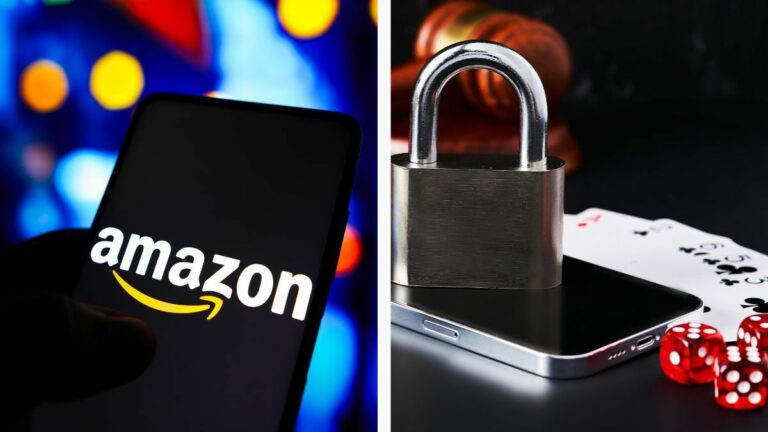
According to a new lawsuit, Amazon.com Inc. earned billions through an Illegal internet gambling enterprise by distributing new social casino and facilitating the purchase of virtual chips. In addition to breaking multiple laws, the brief argues, the actions of Amazon and the “Social Casinos Enterprise” amount to racketeering.
The complaint, filed by Nevada resident Steven Horn, relies heavily on a 2018 US appeals court decision that ruled social casino apps illegal under Washington State law. Despite that, the brief claims that Amazon offers more than 30 illegal casino apps through its “dangerous partnership” with social casinos.
On behalf of the proposed class, Horn seeks restitution, damages, and “relief from Amazon’s ongoing participation in an illegal internet gambling enterprise.”
Social Casinos Increasingly Face Legal Reckoning
Social casinos, explains the filing, are apps playable from smartphones, tablets, and desktops.
This ubiquity, the brief follows, makes the slot experience available to customers anytime and anywhere.
By moving their casino games directly onto the phones and computers of players, and by leveraging an innocuous-sounding “free-to-play” model, social casino companies, along with Defendant Amazon, have found a way to smuggle slot machines into the homes of consumers throughout the United States, 24 hours a day, 7 days a week, and 365 days a year.
The lawsuit is the latest effort targeting online slot machines in Washington federal court.
In a similar case, Meta asked the Ninth Circuit Court of Appeals to dismiss the argument that platform providers are liable for the in-app purchases facilitated between users and third-party providers.
That lawsuit named Meta, Google, and Apple as defendants over their involvement with social casino products.
Usually, in these cases, the companies behind the games argue that because chips are unredeemable, social casinos are distinct from gambling. Oppositionally, plaintiffs typically claim that because chips are required to play, they constitute a “thing of value” legally.
But, by settling these cases before judgment, companies have avoided setting legal precedents.
And if the Ninth Circuit gives Meta its way, that case won’t get even that far.
District Court Judge Edward J. Davila already dismissed the data sharing and advertising arguments in his ruling. However, when it came to facilitating the purchase of chips, Davila referred the question directly to the appeals court rather than enter a verdict.
Now, it’s up to the Ninth Circuit to dismiss or allow the case to proceed. Either outcome could lead to a precedent. Or, parties could settle, leaving the legality question for another day.
Acceptance Shifting in Some States
Still, even without strict precedent, the acceptance of social casinos has started to shift.
Alongside the 2018 Kater v. Churchill Downs ruling, Michigan’s Attorney General Dana Nessel recently shuttered Golden Heart Games (GHG) social casino with an Assurance of Discontinuance.
The platform, Nessel said, constituted illegal gambling:
Unlicensed gaming robs our schools and our government of essential funding and leaves consumers unprotected. When companies like Golden Hearts attempt to circumvent Michigan’s gaming laws, they create the false impression that their games are legal and safe for consumers. My office is committed to ensuring that our gaming laws are strictly enforced and those who violate those laws are held accountable.
Since then, Virtual Gaming Worlds (VGW), another social casino company, announced it’s pulling out of the state.
The company’s official statement reads:
VGW continually evaluates their business operations in the interests of all their stakeholders and after careful consideration they have decided to take this course of action.
Suit: Amazon Liable in Illegal Gambling Conspiracy
In the case against Amazon, Horn brings his claims for damages and injunctive relief under the Washington Return of Money Lost at Gambling Act (RMLGA), the Washington Consumer Protection Act (CPA), and the Racketeer Influenced and Corrupt Organizations Act (RICO).
According to the filing, social casinos are wildly lucrative due to their mix of addictive slot mechanics and the ability to exploit customers prone to addictive behaviors. That exploitation, the brief contends, depends on Amazon’s ability to leverage data to identify and target those consumers.
The lawsuit claims that in 2020 alone, consumers spent an estimated $6 billion on virtual social casino chips.
The brief notes the substantial boost that brings to Amazon’s bottom line.
In exchange for distributing the casino games, providing them valuable data and insight about their players, and collecting money from consumers, Amazon takes a 30-percent commission of every wager, earning billions in revenue.
By comparison, the “house” at a traditional casino only takes 1 to 15 percent while also taking on significant risk of loss in its operation. Amazon’s 30 percent take, on the other hand, is guaranteed for its ability to act as the casino “house” and broker.
Lawyers for the plaintiff claim that “tens of thousands of consumers” have been affected due to Amazon’s social casino partnerships.
Despite knowing that social casinos are illegal, Amazon continues to maintain a 30% financial interest in the upside by brokering the slot machine games, driving customers to them, and acting as the bank.
As such, Amazon is liable as a co-conspirator to an illegal gambling enterprise and conspiracy.
Amazon has not filed a response to the accusations or responded to Bonus’ request for comment.





